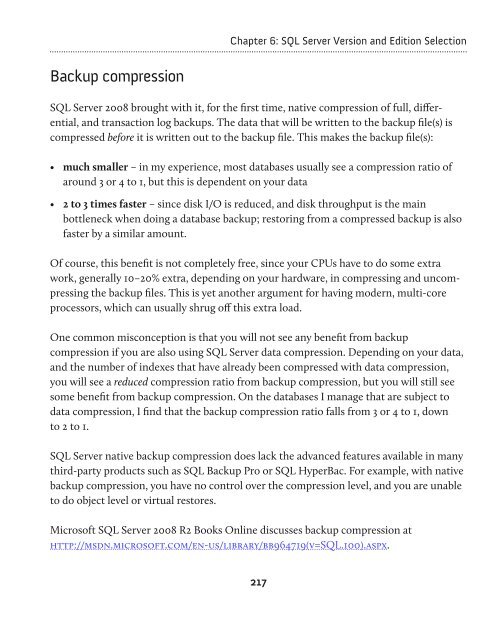- Page 1 and 2:
DBA Handbooks SQL Server Hardware G
- Page 3 and 4:
Copyright Glenn Berry 2011 ISBN 978
- Page 5 and 6:
RAID Configurations ...............
- Page 7 and 8:
Chapter 7: SQL Server Installation
- Page 9 and 10:
About the Author Glenn Berry is a D
- Page 11 and 12:
Introduction At its heart, this is
- Page 13 and 14:
How is the book structured? Chapter
- Page 15 and 16:
Code examples Throughout this book
- Page 17 and 18:
Chapter 1: Processors and Associate
- Page 19 and 20:
Chapter 1: Processors and Associate
- Page 21 and 22:
Level 1 Cache (Per core) Level 2 Ca
- Page 23 and 24:
Chapter 1: Processors and Associate
- Page 25 and 26:
Chapter 1: Processors and Associate
- Page 27 and 28:
Hyper-threading Chapter 1: Processo
- Page 29 and 30:
Chapter 1: Processors and Associate
- Page 31 and 32:
Chapter 1: Processors and Associate
- Page 33 and 34:
Chapter 1: Processors and Associate
- Page 35 and 36:
Chapter 1: Processors and Associate
- Page 37 and 38:
Chapter 1: Processors and Associate
- Page 39 and 40:
Chapter 1: Processors and Associate
- Page 41 and 42:
One-socket server (DW/DSS) Xeon W36
- Page 43 and 44:
Chapter 1: Processors and Associate
- Page 45 and 46:
Chapter 1: Processors and Associate
- Page 47 and 48:
One-socket or budget two-socket ser
- Page 49 and 50:
Chapter 1: Processors and Associate
- Page 51 and 52:
Memory requirements Chapter 1: Proc
- Page 53 and 54:
Chapter 1: Processors and Associate
- Page 55 and 56:
Chapter 1: Processors and Associate
- Page 57 and 58:
Chapter 1: Processors and Associate
- Page 59 and 60:
Chapter 1: Processors and Associate
- Page 61 and 62:
61 Chapter 2: The Storage Subsystem
- Page 63 and 64:
Drive Types 63 Chapter 2: The Stora
- Page 65 and 66:
65 Chapter 2: The Storage Subsystem
- Page 67 and 68:
67 Chapter 2: The Storage Subsystem
- Page 69 and 70:
Attached Storage 69 Chapter 2: The
- Page 71 and 72:
71 Chapter 2: The Storage Subsystem
- Page 73 and 74:
RAID Configurations 73 Chapter 2: T
- Page 75 and 76:
75 Chapter 2: The Storage Subsystem
- Page 77 and 78:
RAID Controllers 77 Chapter 2: The
- Page 79 and 80:
79 Chapter 2: The Storage Subsystem
- Page 81 and 82:
81 Chapter 2: The Storage Subsystem
- Page 83 and 84:
-- Top Cached SPs By Total Logical
- Page 85 and 86:
85 Chapter 2: The Storage Subsystem
- Page 87 and 88:
Chapter 3: Benchmarking Tools Havin
- Page 89 and 90:
89 Chapter 3: Benchmarking Tools ve
- Page 91 and 92:
Characteristic TPC-C TPC-E Tables 9
- Page 93 and 94:
93 Chapter 3: Benchmarking Tools ac
- Page 95 and 96:
95 Chapter 3: Benchmarking Tools Th
- Page 97 and 98:
97 Chapter 3: Benchmarking Tools ti
- Page 99 and 100:
99 Chapter 3: Benchmarking Tools pe
- Page 101 and 102:
101 Chapter 3: Benchmarking Tools O
- Page 103 and 104:
103 Chapter 3: Benchmarking Tools e
- Page 105 and 106:
105 Chapter 3: Benchmarking Tools A
- Page 107 and 108:
Figure 3.6: Example of HD Tune Pro
- Page 109 and 110:
Figure 3.8: CrystalDiskMark scores
- Page 111 and 112:
111 Chapter 3: Benchmarking Tools a
- Page 113 and 114:
113 Chapter 3: Benchmarking Tools i
- Page 115 and 116:
-o2 115 Chapter 3: Benchmarking Too
- Page 117 and 118:
117 Chapter 3: Benchmarking Tools f
- Page 119 and 120:
SQLIOSim 119 Chapter 3: Benchmarkin
- Page 121 and 122:
Figure 3.19: SQLIOSim results. Summ
- Page 123 and 124:
Chapter 4: Hardware Discovery This
- Page 125 and 126:
Figure 4.1: Example of CPU tab in C
- Page 127 and 128:
127 Chapter 4: Hardware Discovery T
- Page 129 and 130:
129 Chapter 4: Hardware Discovery T
- Page 131 and 132:
131 Chapter 4: Hardware Discovery F
- Page 133 and 134:
• information about the processor
- Page 135 and 136:
Figure 4.9: Performance tab in Wind
- Page 137 and 138:
137 Chapter 4: Hardware Discovery
- Page 139 and 140:
Chapter 5: Operating System Selecti
- Page 141 and 142:
Chapter 5: Operating System Selecti
- Page 143 and 144:
Chapter 5: Operating System Selecti
- Page 145 and 146:
Chapter 5: Operating System Selecti
- Page 147 and 148:
Chapter 5: Operating System Selecti
- Page 149 and 150:
Editions and specifications Chapter
- Page 151 and 152:
Chapter 5: Operating System Selecti
- Page 153 and 154:
Chapter 5: Operating System Selecti
- Page 155 and 156:
Chapter 5: Operating System Selecti
- Page 157 and 158:
Editions and specifications Chapter
- Page 159 and 160:
Chapter 5: Operating System Selecti
- Page 161 and 162:
Chapter 5: Operating System Selecti
- Page 163 and 164:
Chapter 5: Operating System Selecti
- Page 165 and 166: Chapter 5: Operating System Selecti
- Page 167 and 168: Chapter 5: Operating System Selecti
- Page 169 and 170: Chapter 5: Operating System Selecti
- Page 171 and 172: Chapter 5: Operating System Selecti
- Page 173 and 174: Chapter 5: Operating System Selecti
- Page 175 and 176: Chapter 5: Operating System Selecti
- Page 177 and 178: Chapter 5: Operating System Selecti
- Page 179 and 180: Chapter 5: Operating System Selecti
- Page 181 and 182: Chapter 5: Operating System Selecti
- Page 183 and 184: Chapter 5: Operating System Selecti
- Page 185 and 186: Chapter 6: SQL Server Version and E
- Page 187 and 188: Chapter 6: SQL Server Version and E
- Page 189 and 190: • Workgroup Edition Chapter 6: SQ
- Page 191 and 192: Chapter 6: SQL Server Version and E
- Page 193 and 194: SQL Server 2008 Evaluation Edition
- Page 195 and 196: Chapter 6: SQL Server Version and E
- Page 197 and 198: Chapter 6: SQL Server Version and E
- Page 199 and 200: Data compression Chapter 6: SQL Ser
- Page 201 and 202: Figure 6.1: Data Compression Wizard
- Page 203 and 204: Chapter 6: SQL Server Version and E
- Page 205 and 206: Chapter 6: SQL Server Version and E
- Page 207 and 208: Chapter 6: SQL Server Version and E
- Page 209 and 210: High Availability features Chapter
- Page 211 and 212: Chapter 6: SQL Server Version and E
- Page 213 and 214: Chapter 6: SQL Server Version and E
- Page 215: Chapter 6: SQL Server Version and E
- Page 219 and 220: Transparent Data Encryption Chapter
- Page 221 and 222: Chapter 6: SQL Server Version and E
- Page 223 and 224: Chapter 6: SQL Server Version and E
- Page 225 and 226: Chapter 6: SQL Server Version and E
- Page 227 and 228: Chapter 6: SQL Server Version and E
- Page 229 and 230: Chapter 6: SQL Server Version and E
- Page 231 and 232: Summary Chapter 6: SQL Server Versi
- Page 233 and 234: Chapter 7: SQL Server Installation
- Page 235 and 236: Chapter 7: SQL Server Installation
- Page 237 and 238: Chapter 7: SQL Server Installation
- Page 239 and 240: Chapter 7: SQL Server Installation
- Page 241 and 242: Chapter 7: SQL Server Installation
- Page 243 and 244: Chapter 7: SQL Server Installation
- Page 245 and 246: Fail-over clustering Chapter 7: SQL
- Page 247 and 248: Chapter 7: SQL Server Installation
- Page 249 and 250: Figure 7.6: "Please wait..." screen
- Page 251 and 252: Figure 7.9: License Terms selection
- Page 253 and 254: Figure 7.11: Setup Support Files in
- Page 255 and 256: Figure 7.13: Setup Role screen. Cha
- Page 257 and 258: Figure 7.15: Installation Rules. Ch
- Page 259 and 260: Chapter 7: SQL Server Installation
- Page 261 and 262: Chapter 7: SQL Server Installation
- Page 263 and 264: Figure 7.20: Database Engine Config
- Page 265 and 266: Chapter 7: SQL Server Installation
- Page 267 and 268:
Figure 7.24: Installation Progress.
- Page 269 and 270:
Chapter 7: SQL Server Installation
- Page 271 and 272:
Chapter 7: SQL Server Installation
- Page 273 and 274:
Chapter 7: SQL Server Installation
- Page 275 and 276:
Chapter 7: SQL Server Installation
- Page 277 and 278:
-- 72GB 67000 -- 96GB 90000 -- Enab
- Page 279 and 280:
Figure 7.29: Server Properties, ser
- Page 281 and 282:
Default backup compression Chapter
- Page 283 and 284:
Number of TempDB data files Chapter
- Page 285 and 286:
Chapter 7: SQL Server Installation
- Page 287 and 288:
Appendix A: Intel and AMD Processor
- Page 289 and 290:
Intel Xeon E3 sequence Appendix A:
- Page 291 and 292:
Appendix A: Intel and AMD Processor
- Page 293 and 294:
Appendix A: Intel and AMD Processor
- Page 295 and 296:
Appendix A: Intel and AMD Processor
- Page 297 and 298:
AMD Opteron 1300 series Appendix A:
- Page 299 and 300:
AMD Opteron 8400 series Appendix A:
- Page 301 and 302:
Appendix A: Intel and AMD Processor
- Page 303 and 304:
Appendix B: Installing a SQL Server
- Page 305 and 306:
Figure B.1: Cumulative Update, Know
- Page 307 and 308:
Appendix B: Installing a SQL Server
- Page 309 and 310:
Appendix B: Installing a SQL Server
- Page 311 and 312:
Appendix B: Installing a SQL Server
- Page 313 and 314:
Appendix B: Installing a SQL Server
- Page 315 and 316:
Appendix C: Abbreviations AMB Advan
- Page 317 and 318:
SPEC Standard Performance Evaluatio
- Page 319 and 320:
ANTS Memory Profiler Find memory le
- Page 321 and 322:
SQL Compare ® Pro Compare and sync
- Page 323 and 324:
SQL Backup Pro Compress, encrypt, a
- Page 325 and 326:
SQL Virtual Restore Rapidly mount l
- Page 327 and 328:
Performance Tuning with SQL Server











